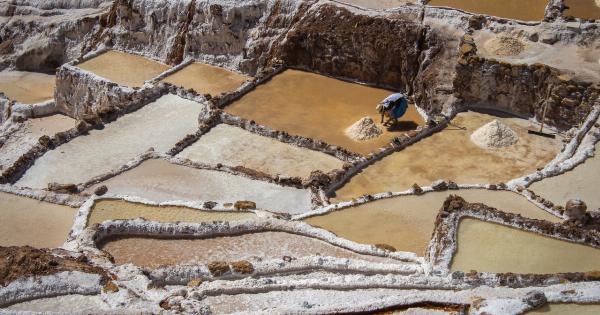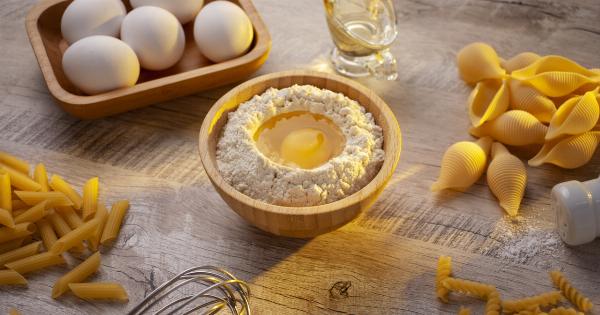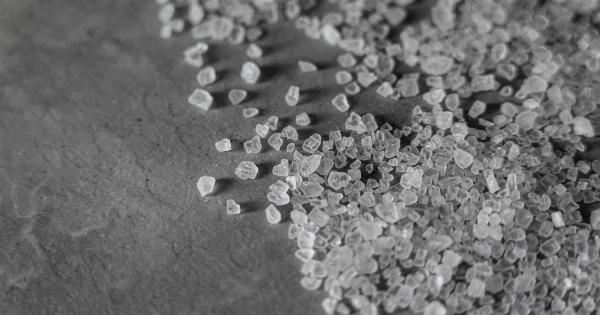Salt, also known as sodium chloride, is an essential mineral required for various bodily functions. It plays a crucial role in maintaining fluid balance, nerve function, muscle contraction, and proper heart rhythm.
While salt is necessary for survival, an excess intake can have detrimental effects on your health. In this article, we will explore how salt affects your body and the potential consequences of consuming too much sodium.
Salt Intake and Blood Pressure
One of the most well-known effects of salt on the body is its impact on blood pressure. When you consume salt, the sodium in it attracts and holds water, which increases the overall volume of blood in your circulatory system.
This, in turn, puts additional pressure on your blood vessels and can lead to elevated blood pressure levels. High blood pressure, also known as hypertension, is a significant risk factor for heart disease, stroke, and other cardiovascular problems.
Salt and Heart Health
In addition to its impact on blood pressure, excessive salt intake can directly affect the health of your heart.
The increased blood volume caused by high sodium levels can strain the heart and contribute to the development of various conditions, including heart failure. Furthermore, higher salt consumption has been linked to an increased risk of coronary artery disease, which can lead to heart attacks and other cardiac events.
Salt and Kidney Function
Your kidneys play a vital role in maintaining the balance of fluids and electrolytes in your body. When you consume excess salt, your kidneys work harder to eliminate the extra sodium through urine.
The increased strain on the kidneys can contribute to the development of kidney disease, reduce their overall function, and potentially lead to kidney stones. Additionally, high-sodium diets have been associated with an increased risk of chronic kidney disease (CKD) progression.
Salt and Bones
While calcium is a key nutrient for maintaining strong and healthy bones, excessive salt intake can interfere with its proper absorption.
High sodium levels in the body increase calcium excretion through urine, which means that your body may not retain enough calcium to support optimal bone health. Over time, this can contribute to decreased bone mineral density and an increased risk of osteoporosis.
Salt and Fluid Balance
As mentioned earlier, salt plays a critical role in maintaining fluid balance within your body. However, consuming too much salt can disrupt this balance.
When sodium levels are high, your body retains more water to dilute the excess sodium and restore balance. This can lead to fluid retention and bloating, particularly in individuals who are salt-sensitive.
It’s important to note that the effects of salt on fluid balance can vary depending on individual factors such as genetics and overall health status.
Salt and Dehydration
Contrary to popular belief, consuming excessive salt can actually contribute to dehydration. When your body retains water to balance out high sodium levels, it may result in increased urine production.
This can lead to more frequent urination and potentially cause dehydration if fluid intake is not sufficient to compensate for the loss. Proper hydration is crucial for overall health and hydration requirements may increase with higher salt intake.
Reducing Salt Intake
Given the potential negative effects of excessive salt intake on health, it is important to monitor and reduce sodium consumption. Here are some tips to help lower your salt intake:.
1. Read Food Labels
Pay attention to the sodium content listed on food labels. Choose lower-sodium or no-salt-added options whenever possible, especially for processed foods like canned soups, sauces, and snacks.
2. Cook at Home
Preparing meals at home allows you to have control over the amount of salt used in your recipes. Experiment with herbs, spices, and other flavorings to enhance the taste of your dishes without relying heavily on salt.
3. Limit Processed Foods
Processed foods are often high in sodium as it acts as a preservative and enhances taste. Limit your consumption of processed and pre-packaged foods, opting for fresh and whole foods instead.
4. Be Mindful of Condiments
Popular condiments like soy sauce, ketchup, and salad dressings can be high in sodium. Use them sparingly or look for low-sodium alternatives or make your own at home with reduced salt.
5. Increase Potassium Intake
Increasing your intake of potassium, another mineral that plays a role in maintaining fluid balance, may help counteract the negative effects of sodium. Foods rich in potassium include bananas, leafy greens, potatoes, and citrus fruits.
6. Be a Smart Shopper
When grocery shopping, choose fresh fruits and vegetables, lean meats, and low-sodium options whenever possible. Shop the perimeter of the grocery store, as this is where the fresh, unprocessed foods are typically found.
7. Practice Moderate Salt Use
While reducing sodium intake is important, it’s crucial not to eliminate salt entirely from your diet. Salt is still necessary for proper bodily function, and a complete absence of salt can lead to electrolyte imbalances.
Practice moderation and use salt sparingly to enhance the taste of your meals.
Conclusion
Salt, in appropriate quantities, is essential for maintaining vital bodily functions. However, excessive salt intake can have detrimental effects on various aspects of your health.
It is crucial to be mindful of your sodium consumption and make efforts to minimize excessive intake. By adopting healthier food choices and reducing reliance on processed foods, you can take control of your salt intake and promote better overall health.



























